
Aboriginal Policy Studies
Scope & Guideline
Elevating Critical Analyses of Aboriginal Issues
Introduction
Aims and Scopes
- Indigenous Governance and Policy Analysis:
The journal focuses on the governance structures and policy frameworks that impact Indigenous communities, examining how these systems can be improved to empower self-determination and enhance community wellbeing. - Cultural Identity and Representation:
A significant aim of the journal is to explore the complexities of Indigenous identity, including issues of authenticity, representation, and the impact of historical narratives on contemporary Indigenous identities. - Social Issues and Community Challenges:
Research that addresses social issues such as crime, victimization, employment, and education among Indigenous populations is a core focus, aiming to provide insights and solutions to these pressing challenges. - Intersectionality in Indigenous Studies:
The journal highlights the importance of intersectionality, particularly in relation to gender, race, and class, in understanding the diverse experiences and struggles of Indigenous peoples. - Reconciliation and Activism:
The journal promotes research on reconciliation efforts and Indigenous activism, examining the dynamics of social movements, advocacy, and the role of art and culture in these processes.
Trending and Emerging
- Gender and Indigenous Issues:
Recent papers increasingly focus on the intersection of gender and Indigenous issues, highlighting the unique experiences of Indigenous women in various contexts, including governance, violence, and community resilience. - Urban Indigenous Experiences:
There is a notable trend towards exploring the experiences of Indigenous peoples in urban settings, addressing issues such as visibility, community support systems, and the impact of urbanization on traditional lifestyles. - Indigenous Knowledge and Education:
Emerging themes emphasize the importance of Indigenous knowledge systems, particularly in academic settings. This includes discussions on how educational institutions can better integrate Indigenous perspectives and practices. - Reconciliation in Practice:
The discourse surrounding reconciliation has evolved to focus not just on theoretical frameworks but also on practical applications and the lived experiences of Indigenous peoples in reconciliation efforts. - Indigenous Activism and Resistance:
A growing body of work examines Indigenous activism, including contemporary movements and resistance strategies, reflecting a shift towards understanding the role of activism in social change.
Declining or Waning
- Historical Narratives:
There appears to be a waning focus on purely historical narratives that do not connect to current issues. Recent publications emphasize contemporary challenges and solutions rather than historical context alone. - General Discussions on Indigenous Rights:
There has been a reduction in broad discussions surrounding Indigenous rights without specific context. More recent articles tend to focus on specific cases or issues rather than general principles. - Pan-Indigenous Perspectives:
The journal seems to be moving away from overarching pan-Indigenous perspectives. Instead, there is a growing emphasis on localized and specific Indigenous experiences and issues, reflecting a more nuanced understanding of diversity within Indigenous communities.
Similar Journals
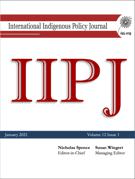
International Indigenous Policy Journal
Transforming Understanding Through Inclusive ScholarshipInternational Indigenous Policy Journal, published by University of Western Ontario, serves as a pivotal platform in the fields of Anthropology, Cultural Studies, and Sociology and Political Science. Since its inception in 2010, this Open Access journal has championed the dissemination of scholarly works that advance the understanding and implementation of indigenous policies globally. Operating from the esteemed academic setting of London, Ontario, Canada, it has solidified its reputation, as evidenced by its impressive category quartile rankings, notably achieving Q1 status in Cultural Studies and Q2 rankings in both Anthropology and Sociology/Political Science in 2023. Researchers, professionals, and students can find exceptional insights within its pages, as it ranks in the top percentiles for its respective fields, reflecting its crucial role in influencing contemporary dialogues surrounding indigenous issues. With a commitment to inclusive scholarship, International Indigenous Policy Journal continues to be an essential resource for those dedicated to understanding and supporting indigenous communities and their policy contexts.

International Journal of Canadian Studies
Advancing Multidisciplinary Insights into CanadaThe International Journal of Canadian Studies, published by University of Toronto Press Inc, serves as a vital platform for scholarly discourse on Canadian culture, politics, and history, reflecting the multidisciplinary nature of studies pertaining to Canada. With an ISSN of 1180-3991 and an E-ISSN of 1923-5291, this journal is poised to contribute significantly to the academic community, fostering insights into Canada’s role in a global context. Adapting to the evolving landscape of research, the journal has implemented a converged publishing model, covering the years from 2020 to 2024, and holds a Q4 ranking in its category for 2023, positioning it within a competitive framework. While the journal currently does not offer open access, it remains committed to enhancing access for scholars and practitioners interested in Canadian studies. Despite its recent establishment in the Scopus ranking system, the journal is dedicated to elevating its impact and utility for researchers, professionals, and students who seek to deepen their understanding of Canadian issues and narratives.

Aboriginal History
Bridging Cultures through Scholarly DiscourseAboriginal History is a premier academic journal dedicated to exploring the rich and diverse histories of Aboriginal and Torres Strait Islander peoples in Australia. Published by the Australian National University, Department of History, this journal plays a critical role in the field of Cultural Studies and History, evidenced by its prestigious Q2 ranking in both categories for 2023. With a focus on fostering scholarly discourse, Aboriginal History provides a platform for researchers, professionals, and students alike to share innovative research, critical analyses, and profound insights into Indigenous histories and cultural narratives. With an enriching blend of diverse methodologies and interdisciplinary approaches, the journal is essential for anyone looking to deepen their understanding of Aboriginal experiences and historiography. Although it does not offer open access, its contributions significantly impact both the academic community and broader societal understanding of Aboriginal histories, making it a vital resource in the field.

Appeal
Exploring the intersection of policy and social equity.Appeal is a distinguished peer-reviewed journal published by APPEAL PUBL SOC based in Victoria, British Columbia, Canada. With its ISSN 1205-612X and E-ISSN 1925-4938, this journal serves as a critical platform for advancing research in the field of social sciences, particularly focusing on issues related to community dynamics, social justice, and policy analysis. Although it is not an open access journal, it maintains high academic standards and aims to publish original research, review articles, and case studies that contribute to the scholarly conversation within its domain. The journal is committed to fostering a comprehensive understanding of contemporary social challenges, making it an essential resource for researchers, professionals, and students dedicated to impactful social research. As the landscape of social sciences continuously evolves, Appeal stands at the forefront, providing insights that are both timely and significant.
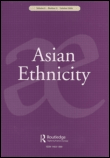
Asian Ethnicity
Exploring the rich tapestry of Asian identities.Asian Ethnicity is a premier academic journal published by Routledge Journals, Taylor & Francis Ltd that serves as an essential platform for interdisciplinary research in the fields of cultural studies, sociology, and political science. With an impressive impact factor and a prestigious ranking within the Scopus database, it has earned a place in the Q1 category for Cultural Studies and the Q2 category for Sociology and Political Science in 2023. This journal not only engages a community of scholars, professionals, and students but also addresses critical issues related to identity, migration, and social dynamics across diverse Asian contexts. The journal has consistently published cutting-edge research since its convergence in 2008, aiming to foster dialogue and understanding in the rapidly evolving landscape of Asian studies, while its location in the United Kingdom enhances its global perspective. While the journal does not currently offer open access options, it remains a valuable resource for in-depth analysis and scholarly discourse regarding Asian ethnicity and its multifaceted implications.
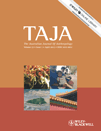
Australian Journal of Anthropology
Exploring Cultures, Shaping PerspectivesThe Australian Journal of Anthropology, published by Wiley, stands as a pivotal resource in the field of anthropology, reflecting a deep commitment to advancing scholarly discourse since its inception in 1990. With an ISSN of 1035-8811 and E-ISSN 1757-6547, this journal provides a platform for innovative research and critical analysis, contributing to the global anthropology community. Based in the United States, at 111 River St, Hoboken, NJ, it has established itself in the Q3 category of anthropology journals, ranking #162 out of 502 in Scopus, placing it in the 67th percentile among its peers. While it is not currently an open-access publication, the journal remains dedicated to accessibility through institutional subscriptions and provides a wealth of insight into anthropological methods and cultural studies. It seeks to foster interdisciplinary dialogue and promote a comprehensive understanding of social dynamics, making it an essential read for researchers, professionals, and students eager to enrich their knowledge and engage with contemporary anthropological issues.
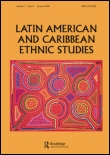
Latin American and Caribbean Ethnic Studies
Unveiling the Complexities of Latin American and Caribbean IdentitiesLatin American and Caribbean Ethnic Studies, published by Taylor & Francis Ltd, stands as a pivotal platform for scholarly dialogue in the realms of anthropology, cultural studies, sociology, and political science. With an ISSN of 1744-2222 and E-ISSN of 1744-2230, this journal has established itself since its inception in 2006, covering a diverse array of topics up to the year 2024. Recognized for its academic rigor, it is categorized within the Q2 and Q1 quartiles based on the 2023 rankings, showcasing its significance within these fields; it ranks in the 79th percentile for cultural studies and 62nd percentile for anthropology according to Scopus. The journal is not only an essential resource for researchers and professionals, but it also serves as an educational tool for students interested in understanding the complex ethnic landscapes of Latin America and the Caribbean. Although it is not an open access journal, its high-impact research contributions make it invaluable for those committed to advancing knowledge in these critical areas of study. This publication fosters a deeper comprehension of the intersectionality of identity, culture, and politics in these regions, thus bridging theories and practices that resonate globally.
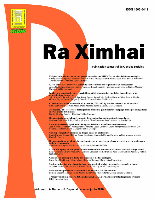
Revista Ra Ximhai
Championing Indigenous Perspectives in Scholarly DiscourseRevista Ra Ximhai is a distinguished academic journal published by Universidad Autónoma Indígena de México, specializing in interdisciplinary studies related to indigenous knowledge, culture, and socioeconomic issues. Since its inception as an Open Access publication in 2005, the journal has championed the dissemination of research that amplifies indigenous voices and perspectives, fostering an enriched understanding of various fields including anthropology, sociology, and environmental studies. Although it does not currently have an H-index or Scopus rankings, Revista Ra Ximhai remains vital for researchers, professionals, and students who are engaged in or studying indigenous rights and cultural preservation. With a commitment to scholarly excellence and accessibility, the journal makes significant contributions to its field, making it an invaluable resource for those dedicated to the advancement of knowledge regarding indigenous communities, especially in Latin America.

Revista Espanola de Antropologia Americana
Illuminating the Dynamics of American AnthropologyRevista Española de Antropología Americana, published by UNIV COMPLUTENSE MADRID, SERVICIO PUBLICACIONES, stands as a significant contribution to the field of anthropology, particularly focusing on American societies and cultures. Since its inception in 1970, this journal has evolved, with issues currently being published until 2024, providing a platform for original research, reviews, and scholarly discourse. Despite being a Q3 category journal in the 2023 rankings, it plays a pivotal role in disseminating knowledge and stimulating academic debate within the anthropology community. With an ISSN of 0556-6533 and an E-ISSN of 1988-2718, Revista Española de Antropología Americana strives to engage researchers, professionals, and students with insightful content that reflects the dynamic nature of cultural studies. Although it operates under traditional access models, the rich array of topics covered ensures its relevance to ongoing scholarly conversation in social sciences and anthropology. Addressing a diverse array of anthropological themes, this journal is essential for anyone looking to deepen their understanding of the cultural frameworks shaping American societies.
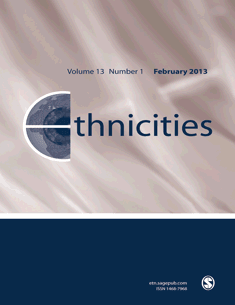
Ethnicities
Charting New Territories in Ethnic and Cultural StudiesEthnicities is a leading academic journal published by SAGE Publications Ltd, dedicated to exploring the complex dynamics of ethnicity, cultural identity, and social interactions within diverse communities. Since its inception in 2001, the journal has established a reputable position in the field of Cultural Studies, evidenced by its impressive Q1 ranking in the Cultural Studies category and Q2 ranking in Arts and Humanities (miscellaneous) as of 2023. With a Scopus ranking that places it in the top 8% of journals in Cultural Studies, Ethnicities aims to facilitate critical discourse, innovative research, and scholarly exchange related to ethnicity across global contexts. Researchers, professionals, and students interested in investigating the intricate intersections of race, identity, and social policy will find valuable insights within its pages. For further engagement and access to its comprehensive articles, the journal is available without Open Access options, serving as a vital resource for understanding contemporary issues in ethnicity and cultural relations.